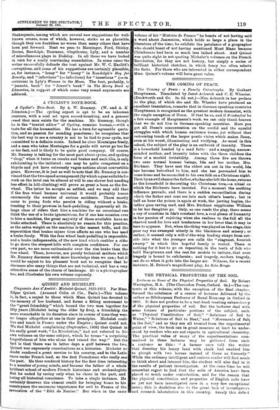THE COMING OF PEACE.
The Coming of Peace : a Family Catastrophe. By Gerhart Hauptmann. Translated by Janet Achurch and C. E. Wheeler. (Duckworth and Co. 3s. Gd. net.)—Miss Achurch in her preface to the play, of which she and Mr. Wheeler have produced an excellent translation, remarks that in German-speaking countries Hauptmann is recognised as the greatest modern dramatist, with the single exception of Ibsen. If that be so, and if Priedenfest be a fair example of Hauptmann's work, we can only thank heaven that we do not live in German-speaking countries. Here you get all Ibsen's concentration on the sordid and the squalid struggles with which human existence teems, yet without that redeeming touch of the larger poetic vision which makes Ibsen, even at his worst, illuminating and vivifying. As usual in this school, the subject of the play is an outbreak of insanity. There is a household headed by a mad fathe and a nagging, narrow- minded mother, and insanity takes with the three children the form of a morbid irritability. Among these five are thrown two sane normal human beings, Ida and her mother, Mrs. Buchner. They have met the eldest son out in the world. Ida has become betrothed to him, and she has persuaded him to come home and be reconciled to his own folk on a Christmas night. Then by an evil chance the father,who has also left the home,returns as the household is decorating the Christmas tree,—a ritual on which the Bilchners have insisted. For a moment the soothing influence prevails, and there is a sudden reconciliation during which the father and sons see into each other's hearts ; but in half an hour the poison is again at work, the jarring begins, the tether goes raving mad, and Mrs. Btiohner supplicates William to let her daughter go. Only, as one reads the play, there seems a ray of sunshine in Ida's constant love, a real gleam of humanity in her passion of rejoicing when she realises to the full all the starved need for love and tenderness in her lover that it may be hers to appease. But, when the thing was played on the stage, this poor ray was swamped utterly in the blackness and misery ; or rather, it seemed only a will-o'-the-wisp leading strays from out- side into what the younger son calls the "stagnant, feverish swamp" in which this hopeful family is rooted. There is nothing for it but to go on repeating, in the teeth of folk who hold Hauptmann and the rest for models to imitate, that even tragedy is bound to exhilarate ; and tragedy, modern tragedy, can do so when it gets into the larger air. Witness, for a recent instance, M. Brieux's magnificent play, La Robe Rouge.


















































 Previous page
Previous page